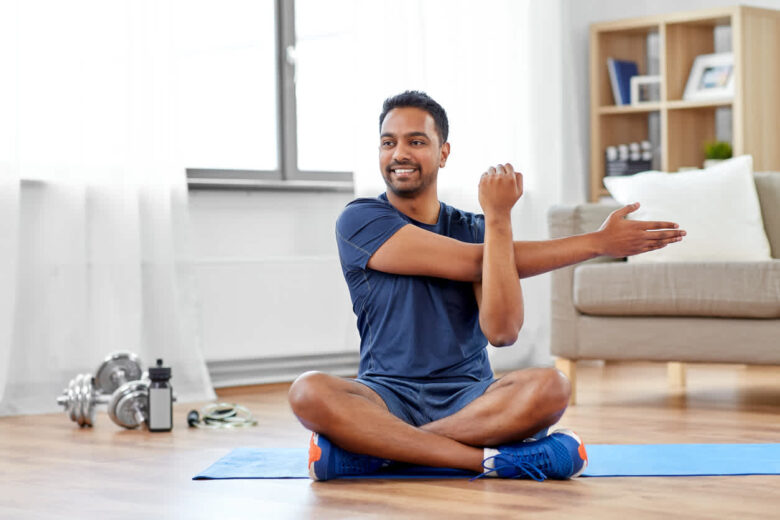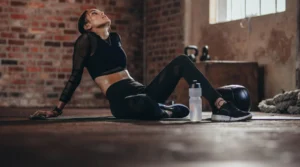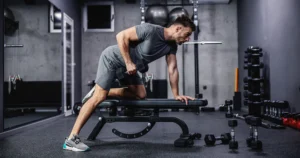You don’t always have to go to a gym or buy expensive fitness equipment to start exercising. Many people feel intimidated by the thought of intense workouts or space-consuming fitness equipment. The good news is that basic exercises you can do at home can help you become healthier and more energetic and feel better about yourself. Most of these exercises don’t require much preparation or a large space, so anyone can do them, regardless of age or fitness level.
Why Working Out at Home Works
Working out at home is effective because it easily fits into your schedule. You don’t have to go to a gym; you can start working out right away in your living room, bedroom, or even a small space at home. The flexibility makes it hard to skip a workout, which is often the hardest part for beginners. Regular exercise, even for short periods, improves circulation, builds muscle strength, and improves mental health. When you work out at home, you can set your pace and follow your rhythm. This makes the workout experience easier and more enjoyable.
Starting With Stretching
Stretching is a wonderful way to start your home fitness routine. It wakes up your muscles, makes them more flexible, and prepares your body for the upcoming movements. Raising your arms overhead, touching your toes, or gently rotating your torso can help relieve tension and stiffness from prolonged sitting. Stretching also helps prevent injuries by warming up your muscles and joints. Stretching is a good starting point for fitness beginners because it’s easy to do and can boost their confidence.
The Power of Walking in Place
Walking in place is one of the simplest exercises you can do at home. It doesn’t require much space and offers the same benefits as exercising outdoors. By simply lifting your knees and swinging your arms for a few minutes, you’ll increase your heart rate, boost your circulation, and burn calories. You can do the exercises while watching TV, listening to music, or even during a break at work. Over time, increasing the speed or length of this basic movement can help build your endurance and manage your weight.
Strength From Bodyweight Exercises
You can build strength with bodyweight exercises without equipment. You can do squats, push-ups, or wall squats at home and adjust the exercises to your fitness level. These exercises work large muscle groups, help maintain your balance, and are beneficial for your bones. If you’re just starting out, you can make the exercise easier by switching to knee push-ups or half squats. These exercises will still help you. With regular practice, your muscles become stronger, making activities like climbing stairs and lifting weights easier.
Core Balance Exercises
A strong core is essential for your health because it helps you stand upright, maintain your balance, and move throughout the day. You can do simple core exercises like planks, sitting leg raises, or simple twists, even on the floor or in a chair. These exercises not only strengthen your core but also reduce the risk of back problems. You don’t have to spend a lot of time at home training your core muscles; even a few minutes a day can significantly improve your strength and stability.
Core Balance Exercises
A strong core is essential for your health because it helps you stand upright, maintain your balance, and move throughout the day. You can do simple core exercises like planks, sitting leg raises, or simple twists, even on the floor or in a chair. These exercises strengthen your core and reduce the risk of back problems. You don’t have to spend a lot of time at home training your core muscles; even a few minutes a day can significantly improve your strength and stability.
Benefits of Light Aerobic Exercise
You don’t have to do intense aerobic exercise at home to see results. You can improve your heart health and increase your heart rate by doing light exercises like jumping jacks, marching in place, or dancing to your favorite music. These activities can be adapted to your comfort level, making them perfect for beginners. The best part about aerobic exercise is that it can also make you feel better and less stressed. While exercising, your body releases endorphins, which make you feel happier and more energetic.
Developing an Effective Fitness Plan
The most important factor in the success of any fitness plan is sticking to it. Developing a routine at home can help you maintain self-discipline and make exercise a part of your daily routine. Starting with short workouts, such as 10 to 15 minutes a day, can prevent burnout and make it easier to stick to your plan. You can gradually increase the duration of your workouts or add variety. Listening to your body and taking breaks when needed is also crucial, because recovery is just as important as exercise when it comes to developing healthy habits.
Staying Motivated at Home
Staying motivated outside the gym can be challenging, but there are ways to do it. You can keep your workouts fun by setting small goals, tracking your progress, or listening to music. Some people also find motivation by watching online workout videos or joining online groups where they can share their achievements. Celebrating small progress, like stretching daily for a week, can also help you feel more motivated and successful.
Conclusion
Simple home exercises show that staying healthy doesn’t have to be difficult, expensive, or time-consuming. Stretching, walking on the spot, or light bodyweight exercises are great options for everyone, regardless of age or fitness level. These exercises benefit both your physical and mental health by reducing stress and increasing your energy. You can make exercising at home a lifelong habit by starting small and gradually increasing your activity to live a healthier and more active life. The most important thing is to exercise regularly, enjoy it, and remember that everything you do contributes to your health.
FAQs
1. Can you get in shape by working out at home?
Yes, regularly working out at home can make you stronger, more flexible, and more fatigue-resistant, without having to go to the gym.
2. How much time should I spend working out at home each day?
Beginners only need 10 to 20 minutes of exercise per day. As your strength increases, you can increase the time.
3. Do I need equipment to work out at home?
No, many good exercises are based on your body weight. However, a yoga mat or resistance band can make working out more enjoyable.
4. What if I have limited space at home?
Most exercises, such as walking on the spot, squats, or planks, don’t require much space and therefore work well in a compact environment.
5. How can I continue working out at home?
Make a plan, start small, and find something you enjoy to stay motivated and consistent.




